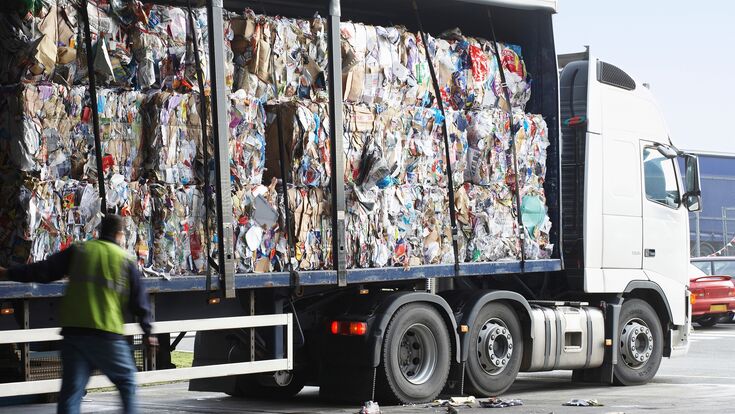25 de mayo de 2023
The Council of the European Union has agreed its negotiating mandate to enter into talks with the European Parliament on a proposal to update EU legislation on cross-border shipments of waste.
Banning waste exports is becoming more and more likely for EU member states. Now the European Council announced that it has adopted its negotiating mandate to open talks with the European Parliament on a proposal to bring EU legislation on cross-border waste shipments up to date. The objective is to ensure that international shipments of waste don’t pose a threat to human health and the environment and to foster the use of waste as a resource in a circular economy. The European Parliament has already called for stricter rules for waste shipment back in January 2023.

The proposal to revise the Waste Shipment Regulation aims to
- guarantee that waste is only shipped to destinations where it will be properly treated
- modernise, harmonise and digitise procedures for shipments within the EU and promote waste shipments destined for recycling
- fight illegal waste shipments, which fall through the cracks due to diverging procedures and lack of control.
In its negotiating mandate, the Council agreed to the broad objectives of the new proposal. In particular, it agreed to ban exports of waste for disposal in another Member State except under strict conditions and to ban shipments of non-hazardous waste to non-OECD countries unless they give their explicit consent and can demonstrate that they will treat the waste in an environmentally sound manner.
Stay connected – subscribe to our newsletters!
The Council made several modifications to the original proposal. Such as «more realistic timelines in the procedure of prior written notification and consent, ‘PIC'», as it says in a statement. Exporters must notify and receive written consent from the countries of dispatch, destination and transit prior to export.
In the case of so-called ‘green-listed waste’, for which a less stringent procedure applies, the Council has included stricter requirements to improve control of these waste streams and a take-back procedure in case their shipment cannot be completed as intended.
Regarding take-back obligations in the specific case of illegal shipments, the Council added the possibility to make alternative arrangements for the recovery or disposal of the waste instead of applying a take-back procedure.
We cannot continue to export our waste problems. This regulation will give us better guarantees that the waste we send abroad doesn’t harm health and the environment. Inside the EU, it will encourage the use of waste as a secondary material so that waste can bring positive economic value to us and contribute to a more circular economy.
Romina Pourmokhtari, Swedish Minister for Climate and the Environment
Digitised procedures
Streamlining and digitising the notification, consent and information procedures for intra-EU shipments is also a key element. In order to ensure clarity and consistency throughout the Regulation, the Council has introduced several amendments concerning the electronic exchange of documentation system. Some notification deadlines should, according to the Council, be extended in order to give the competent authorities sufficient time to receive and assess the information and documentation.
Exports outside the EU
Concerning shipments outside EU Member States, the Council has reached an agreement that waste management facilities in the country of destination should be audited by independent bodies every three years. The audits would demonstrate that the facilities treat waste in an environmentally sound manner, and operators would only be allowed to export waste to these facilities if this was the case.
Member states proposed the creation of a register, maintained by the Commission, containing information on facilities that have been audited, to help waste exporters prepare for shipments. But exporters would remain responsible for ensuring that their exports are environmentally sound. The Council also clarified which waste, in particular unlisted waste, can be exported and how.
Para evitar el contrabando de residuos como productos usados, el Consejo acordó facultar a la Comisión para que adopte actos de ejecución que establezcan criterios para distinguir los productos usados de los residuos. La Comisión también podría armonizar la clasificación de los residuos a nivel de la UE, en particular mediante la adopción de actos delegados para establecer criterios, como umbrales de contaminación para los residuos, para determinar qué tan dañinos son y evitar malentendidos sobre si deben estar sujetos al procedimiento de notificación.
Transportes ilegales de residuos
El tráfico de residuos sigue siendo un gran problema que la UE quiere abordar. Al aceptar la propuesta de la Comisión de crear un Grupo de Control de Envíos de Residuos, el Consejo facilita y mejora la cooperación y coordinación entre los Estados miembros para prevenir y detectar envíos ilegales .
Los Estados miembros acordaron autorizar a la Comisión a llevar a cabo acciones de investigación y coordinación en relación con los envíos ilegales. El objetivo de estas acciones sería apoyar y complementar las actividades de ejecución de los Estados miembros, pero no interferir en los procesos penales o procesos judiciales nacionales.
Con respecto a las sanciones por infracciones, el Consejo añadió flexibilidad para que los Estados miembros adapten las disposiciones sobre multas a sus diferentes ordenamientos jurídicos nacionales.
En cuanto al plazo, el Consejo propone que las nuevas condiciones para la exportación de residuos se apliquen después de tres años para permitir más tiempo de preparación. Las normas relativas a la Comisión se aplicarían inmediatamente, mientras que la fecha principal de aplicación del nuevo Reglamento debería ser 24 meses después de su entrada en vigor.
Como siguiente paso, el Consejo iniciará negociaciones con el Parlamento Europeo para llegar a un acuerdo sobre la forma final de la legislación. Tan pronto como se alcance un acuerdo provisional, el texto final deberá ser adoptado formalmente por ambas instituciones.
